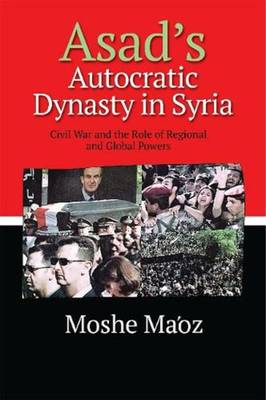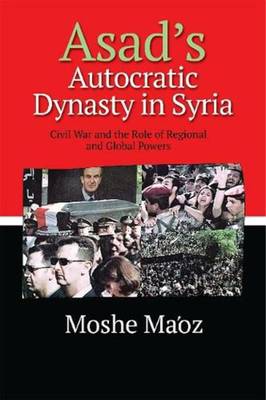
- Afhalen na 1 uur in een winkel met voorraad
- Gratis thuislevering in België vanaf € 30
- Ruim aanbod met 7 miljoen producten
- Afhalen na 1 uur in een winkel met voorraad
- Gratis thuislevering in België vanaf € 30
- Ruim aanbod met 7 miljoen producten
Zoeken
Asad's Autocratic Dynasty in Syria
Civil War and the Role of Regional and Global Powers
Moshe Ma'oz
Paperback | Engels
€ 110,45
+ 220 punten
Omschrijving
In 2011, the diplomatic and expert consensus was that Bashar al-Asads regime would fail, causing Syria to disintegrate into several ethnic enclaves or mini-states. A decade later and Bashar is still in control, having defeated the rebels and gained the support of Russia. The years of internal warfare have brought about changes in the spectrum of parties involved in the Syrian state, and the final outcome is inevitably going to be shaped by geo-politics. The Alawi minority still in large measure controls the Sunni-Muslim (Arab) majority. The other players are a gallery of ever changing allegiances: ISIS, Jabhat al-Nusra, and many other radical Islamic groups; the Muslim Kurdish and Christian Arab communities; as well as Shii Lebanese Hizballah. External horizon players are Iran; Sunni Turkey and Saudi Arabia; Jewish Israel; the United States and Russia. This study aims to analyze the agendas, actions, and interrelations of these various actors from 2011 until the present. It will discuss their ongoing politics and assess forthcoming developments. Both Iran and Russia continue to support Bashar, but compete for political, military, and economic influence. The US has greatly reduced involvement, keeping only 900 troops in northeastern Syria, to protect its Kurdish allies and fight against ISIS. Turkey still occupies parts of northern Syria, with the aim of eliminating the Kurdish forces. Syrian and Russian military attempts to conquer this area continue sporadically. The Israeli air force has attacked Iranian and Hizballah positions with the tacit approval of Russia. However, Russias war on Ukraine in February 2022 may result in restricting Israeli interdictions and instead enhance cooperation with Tehran in order to counter the US and NATO. Both Russia and Iran have been incapable of reconstructing the massively destroyed Syrian infrastructure; the US and Europe are reluctant to contribute due to Bashars continued Alawi minority-based autocratic and corrupt rule.
Specificaties
Betrokkenen
- Auteur(s):
- Uitgeverij:
Inhoud
- Aantal bladzijden:
- 176
- Taal:
- Engels
Eigenschappen
- Productcode (EAN):
- 9781789761993
- Verschijningsdatum:
- 1/01/2023
- Uitvoering:
- Paperback
- Formaat:
- Trade paperback (VS)
- Afmetingen:
- 152 mm x 229 mm
- Gewicht:
- 244 g

Alleen bij Standaard Boekhandel
+ 220 punten op je klantenkaart van Standaard Boekhandel
Beoordelingen
We publiceren alleen reviews die voldoen aan de voorwaarden voor reviews. Bekijk onze voorwaarden voor reviews.








